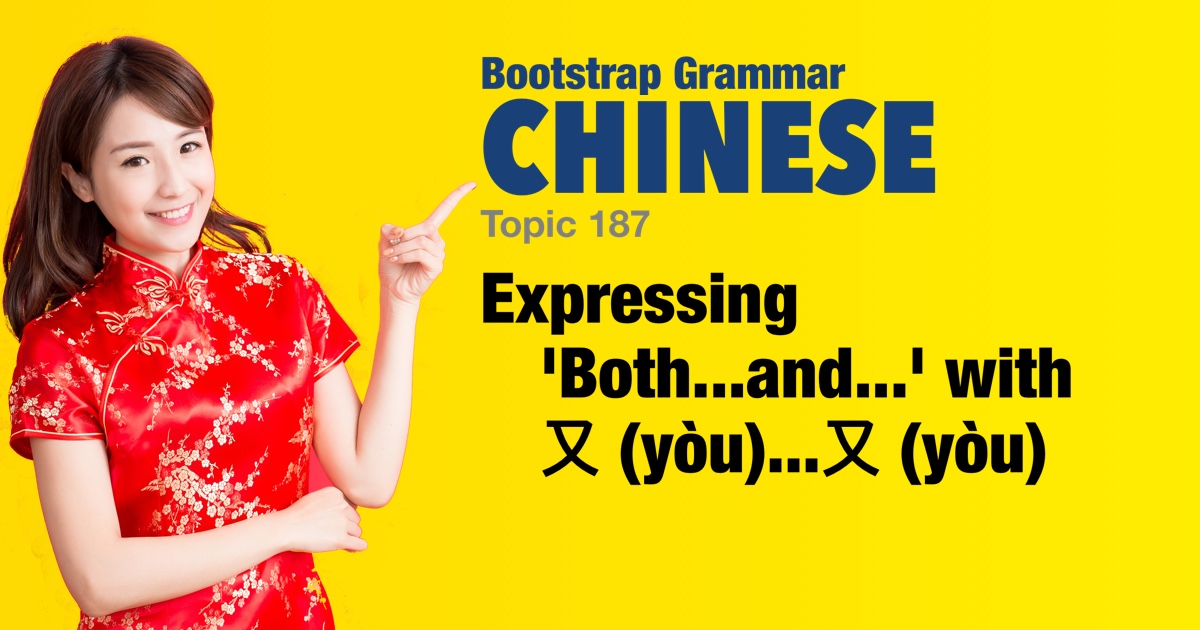Chinese grammar - Expressing 'Both...and...' with 又 (yòu)...又 (yòu) |
|||
|
|||
In Chinese, the structure 又 (yòu)...又 (yòu) is used to describe two simultaneous qualities or actions. — It can be translated as 'both...and…' in English. The pattern is 又 + [adjective/verb[ + 又 + [adjective/verb] |
| Examples: | |
|
他又高又壮。
tā yòu gāo yòu zhuàng. He is both tall and strong.
|
|
|
她又聪明又勤奋。
tā yòu cōngmíng yòu qínfèn. She is both smart and diligent.
|
|
|
这个地方又漂亮又安静。
zhè ge dìfāng yòu piàoliang yòu ānjìng. This place is both beautiful and quiet. |
|
|
他做这件事又快又好。
tā zuò zhè jiàn shì yòu kuài yòu hǎo. He did this thing both quickly and well. |
|
|
那本书又有趣又有用。
nà běn shū yòu yǒuqù yòu yǒuyòng. That book is both interesting and useful.
|
|
|
这顿饭又便宜又好吃。
zhè dùn fàn yòu piányi yòu hǎochī. This meal is both cheap and delicious.
|
|
|
她的孩子又听话又聪明。
tā de háizi yòu tīnghuà yòu cōngmíng. Her child is both obedient and smart.
|
|
|
为了考试取得好成绩,他又读书又做练习。
wèile kǎoshì qǔdé hǎo chéngjì,#tā yòu dúshū yòu zuò liànxí. In order to get good grades in the exam, he both reads books and does exercises.
|
|
|
他又聪明又勤奋,看来会有好前途。
tā yòu cōngmíng yòu qínfèn,#kànlái huì yǒu hǎo qiántú. He is both smart and diligent, it seems he will have a good future.
|
|
|
为了改善健康,她又跑步又做瑜伽。
wèile gǎishàn jiànkāng,#tā yòu pǎobù yòu zuò yújiā. In order to improve her health, she both runs and does yoga.
|
|
|
他为了家人又工作又做家务。
tā wèile jiārén yòu gōngzuò yòu zuò jiāwù. He both works and does housework for the sake of his family.
|
|
|
为了节省时间,我们又骑车又步行。
wèile jiéshěng shíjiān,#wǒmen yòu qíchē yòu bùxíng. In order to save time, we both ride bikes and walk.
|
|
|
她又努力又有天赋,看来会成功。
tā yòu nǔlì yòu yǒu tiānfù,#kànlái huì chénggōng. She is both hardworking and talented, it seems she will succeed.
|
|
|
这样做又省钱又环保。
zhèyàng zuò yòu shěngqián yòu huánbǎo. Doing it this way is both economical and environmentally friendly.
|
|
 |
|




